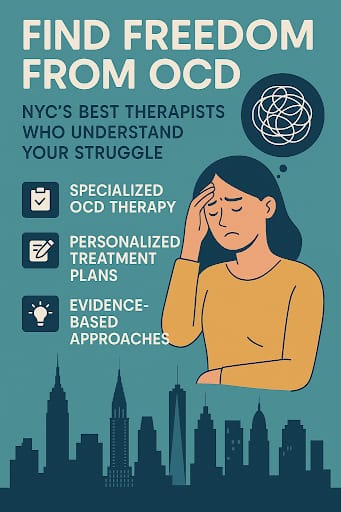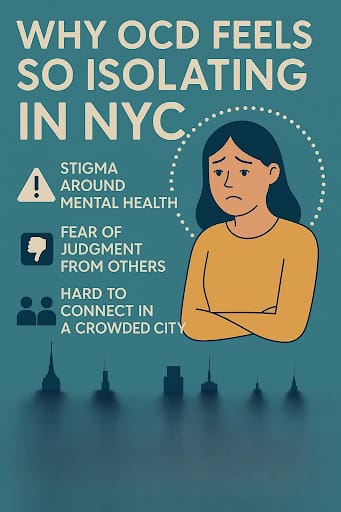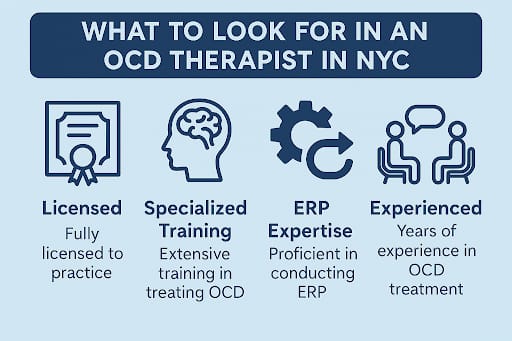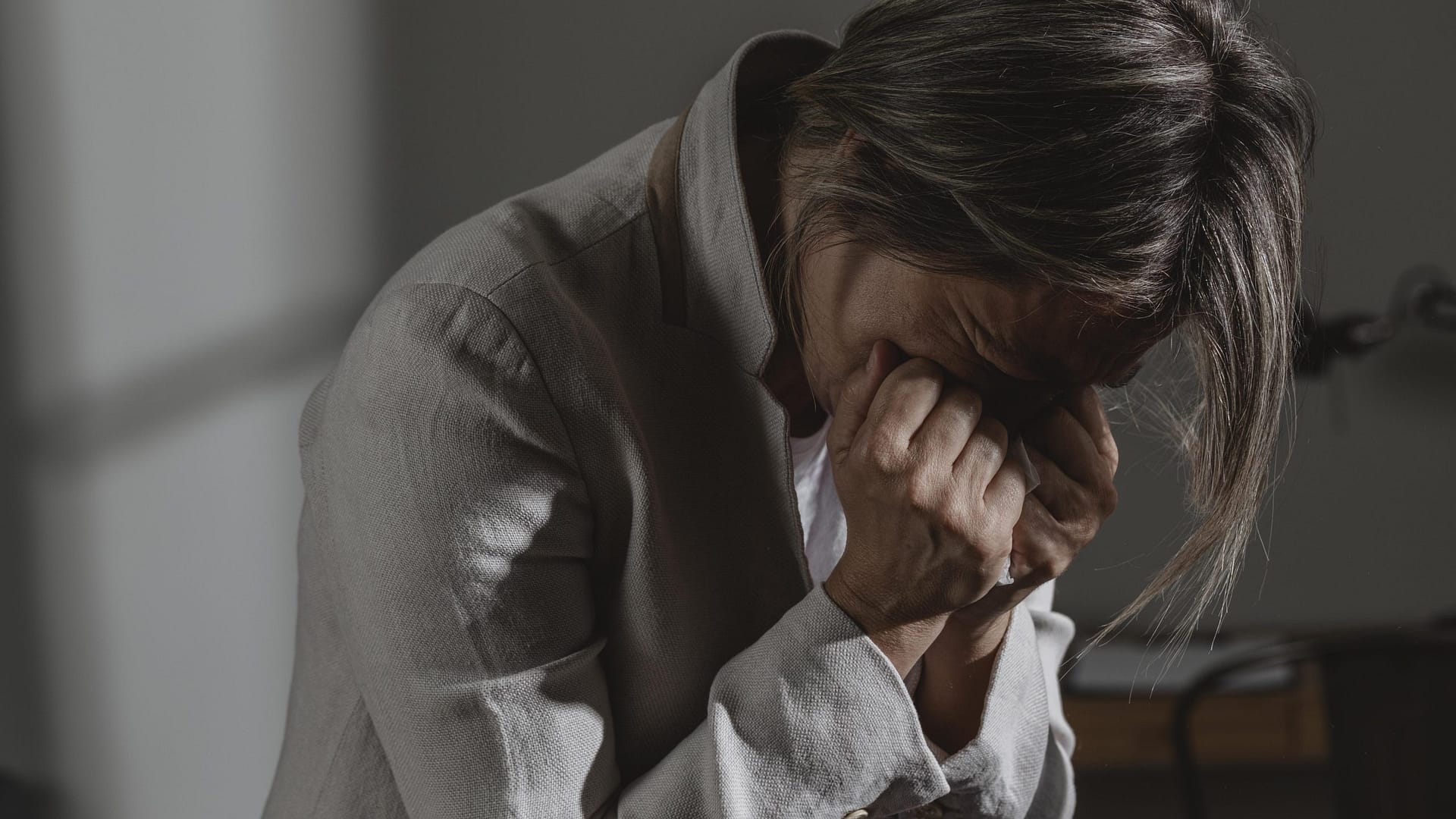
INTRODUCTION
Do you ever feel like you are trapped in a cycle of obsessive thoughts and compulsive behaviors that interfere with your life? Dealing with OCD can be a heavy burden to carry, and especially with the pressure of living in the fast-paced environment of New York City.
The good news is you do not have to deal with it alone! There are many highly trained OCD therapists in NYC who can truly understand the complexities of your experience and can offer you a path towards recovery.
This blog intends to help you find the best therapists in New York that offer high-level, evidence-based care, and are genuinely compassionate about your experience so that you can find freedom from OCD once and for all.
Understanding OCD: More Than Just “Being Neat”
Obsessive-Compulsive Disorder (OCD) is commonly mischaracterized as simply being obsessive with neatness or peculiar habits, however it actually is a lifelong and distressing mental health condition.
- OCD entails obsessions that share a repetitive and intrusive nature. An example would be obsessive thought, images or urges that cause distress or anxiety; common examples include thoughts of contamination, thoughts of harming others, thoughts related to morality.
- Appropriate responses include compulsions, which can take the form of repetitive behaviours or mental ritual behaviours. Examples of compulsions include excessive hand washing, checking things, counting, and silent praying.
People suffering from OCD can have these cycles of obsessions and compulsions for long periods of time, resulting in a major impairment to activities of daily life, relationships, and work life.
While it is true that some personalities have particular neatness or idiosyncrasies, it is important to recognize that OCD is more than just a personality trait, condition or quirk.
In fact, OCD is something that can be very debilitating. The DSM-5 recognizes that OCD is present in approximately 1-2% of the population, and is often comorbid or co-occurring with other mental illnesses like depression and anxiety, making the diagnostic process and treatment very complex.
Why OCD Feel So Isolating in NYC

There can be additional isolation with OCD while living life in New York City, due to the constant pace and noise, crowded spaces and the heart-pounding immediacy of it all. OCD can amplify intrusive thoughts and compulsive behaviors leaving the individual in emotional turmoil, isolated from being understood.
They are also brought to believe from others’ perception of OCD that their behavior is simply a quirk, no deeper emotional distress. Finding a qualified therapist is a difficult task, as there is a vast, fast and complex mental health system to navigate.
The isolation people feel can be from the thoughts and/or compulsions, but also the lack of understanding of people regarding their disorder. The true freedom from OCD starts with acknowledgment of the severity of your OCD and with finding professional evidence-based treatment designed for you.
Types of OCD Therapy in NYC
OCD treatment can be life-changing, providing the opportunity to regain control and peace of mind.
- The gold standard for OCD is Exposure and Response Prevention (ERP), where the individual is gradually exposed to the fears tied to obsessive thought and prevented from engaging in the associated compulsive behaviors.
- The underlying goal is to demonstrate to the brain that anxiety can go away without engaging in rituals. ERP is usually combined with Cognitive Behavioral Therapy (CBT), wherein clients learn how to reframe distorted thinking patterns and challenge the more irrational beliefs that energize compulsive behavior.
- Acceptance and Commitment Therapy (ACT), another method of treatment, promotes mindfulness and helps the individual accept the fact they are experiencing distressing thoughts without reacting to them, and supports client’s awareness of their values in their life.
- In certain cases, medication – typically SSRIs – is used to help with symptom severity, thereby facilitating more effective therapy.
Many of the best mental health practitioners in NYC have training in evidence-based methods and often work together to create a personalized strategy to help their clients take back even the smallest parts of their life.
OCD Therapy: What Can It Treat?
OCD therapy provides thorough help for people experiencing the wide-ranging challenges of Obsessive-Compulsive Disorder.
- The focus of therapy is enabling clients to manage intrusive and/or obsessive thoughts (i.e., persistent, unwanted thoughts, images, or urges that elicit an intense sense of anxiety).
- While also addressing compulsive behaviors or mental rituals clients perform to “neutralize” the obsessions. Therapy will aim to help clients incrementally slow down and eventually stop these patterns.
- One of the final goals is to reduce the overall intensity of obsessive thoughts and accompanying emotional distress, enabling clients to feel more in control of their minds and actions.
- OCD can disrupt many aspects of daily living— including work, relationships, and performance in school. Therapy aims to restore a sense of “normalcy” and productivity.
- Additionally, since many people with OCD also commonly experience depression as well, treatment may often include a few strategies to manage low mood and exhaustion (i.e., emotional fatigue etc.).
- Treatment will also touch on interpersonal issues by providing tools for more effective communication, psychoeducational family members and loved ones about OCD, and creating a supportive environment that will comprise understanding and healing.
What to Look For In An OCD Therapist in NYC

When looking for OCD treatment in New York City, you will want to find someone who has specialized training on Obsessive-Compulsive Disorder (OCD) and who utilizes evidence-based methodology (primarily Exposure and Response Prevention, or ERP).
- Search for therapists that list OCD as a specialty and who have the credentials to treat OCD (PhD or PsyD psychologists, LCSWs and LMHCs) and have experience in treating OCD.
- A competent therapist should not only have the proper credentials to treat OCD, but be open about and structured in their approach, ideally explaining the therapy process early on and guiding their client appropriately.
- Just as vital as a therapist’s experience and process, is the therapeutic relationship. Your comfort, trust, and wanting to take the necessary growth steps in processing your thoughts, feelings and bodily sensations are huge roles in a successful outcome.
What Recovery Looks Like: Progress, Not Perfection
Recovering from OCD is a journey built upon progress, not perfection. It does not require eliminating all anxiety or intrusive thoughts; it’s about learning to distance those thoughts and understand they do not define you.
Also, a big aspect of the recovery process is developing the ability to refrain from compulsively responding, which may provide short-term relief or negation, but also continues to reinforce the disorder.
Recovery is living a life based on values and goals rather than fear and avoidance. You are provided with support from skilled psychologists who specialize in treating OCD. They help you to learn that discomfort is a difficult, but not harmful, part of life and that you are more capable than the disorder. This enables you to take charge and build resilience over time.
Beyond Therapy: Building a Supportive Life
Recovering from OCD involves more than treatment, it involves creating a way of life that is supportive towards your healing.
- Connecting with local support groups, such as our directory from the IOCDF or groups from Meetup in NYC, gives you a supportive connection to others experiencing similar feelings.
- Mindfulness practices and activities—using apps like Headspace or Insight Timer—keep you in the present moment.
- Gentle exercises like walking or yoga can lessen anxiety and promote well-being.
- Avoid too many reassurance-seeking behaviors which give you a fleeting feeling of relief but ultimately strengthen your OCD.
- And of course, the most important thing to remember is to rejoice in your success—every exposure you do, every compulsion you resist is an enormous accomplishment of your recovery process.
Final Thought
The journey to break free from OCD is possible with the right support and treatment.
- There are many experienced OCD therapists in NYC who are familiar with your struggles and will offer compassionate and effective care.
- With treatment such as exposure and response prevention (ERP), cognitive behavioral therapy (CBT), acceptance and commitment therapy (ACT) and where indicated, medication, you can regain control over the intrusive thoughts and compulsions.
Recovery is a progression towards resilience and living a life devoted to your values. You are never alone, you have the dedicated OCD therapists in NYC and community to support you and there is hope, healing, and the possibility for change is real.
Reference
- National Library of Medicine. (n.d.-b). Obsessive-Compulsive Disorder. https://medlineplus.gov/obsessivecompulsivedisorder.html
- Hezel, D. M., & Simpson, H. B. (2018). Exposure and response prevention for obsessive-compulsive disorder: A review and new directions. Indian Journal of Psychiatry, 61(Suppl 1), S85. https://doi.org/10.4103/psychiatry.IndianJPsychiatry_516_18
- Vakili, Y., & Gharraee, B. (2014). The Effectiveness of Acceptance and Commitment Therapy in Treating a Case of Obsessive Compulsive Disorder. Iranian Journal of Psychiatry, 9(2), 115. https://pmc.ncbi.nlm.nih.gov/articles/PMC4300464/
- Gragnani, A., Zaccari, V., Femia, G., Pellegrini, V., Tenore, K., Fadda, S., Luppino, O. I., Basile, B., Cosentino, T., Perdighe, C., Romano, G., Saliani, A. M., & Mancini, F. (2022). Cognitive–Behavioral Treatment of Obsessive–Compulsive Disorder: The Results of a Naturalistic Outcomes Study. Journal of Clinical Medicine, 11(10), 2762. https://doi.org/10.3390/jcm11102762
- Reis, A., Westhoff, M., Quintarelli, H., & Hofmann, S. G. (2024). Mindfulness as a therapeutic option for obsessive-compulsive disorder. Expert Review of Neurotherapeutics, 24(8), 735–741. https://doi.org/10.1080/14737175.2024.2365945






